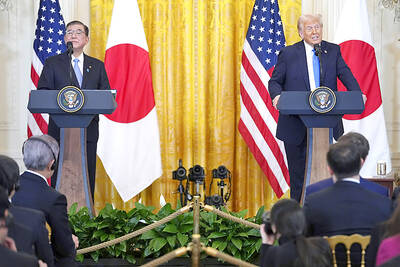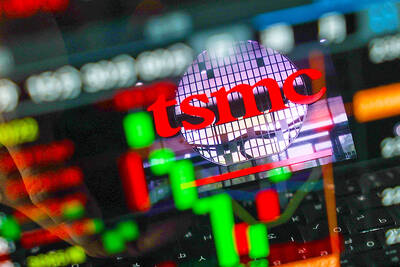The government should protect agricultural techniques and cultivars as “sensitive technology,” and punish people who export such technology abroad, Agricultural Bank of Taiwan chairman Wu Ming-ming (吳明敏) said yesterday.
After China on Friday last week abruptly announced that it would suspend imports of pineapples from Taiwan from Monday, Chinese state-run media began promoting pineapples grown in Guangdong Province, including the Taiwanese-developed Golden Diamond type.
Taiwan has precious semiconductor and agricultural techniques, but many of them are said to have been exported to China, Wu told a news conference in Taipei promoting pineapple exports.

Photo: Sam Yeh, AFP
Wu called on the government to take action to protect newly developed fruit cultivars to prevent them from flowing to China and to help to promote local products.
The plight of Taiwan’s pineapple growers is the result of an excessive reliance on China’s market, which accounts for more than 90 percent of exported pineapples, he said.
However, prices are not necessarily good when the quantity is large, he said.
Taiwan should not compete with other nations in terms of volume; instead, it should boost the image of local crops by promoting those with traceable certification logos, while diversifying export destinations, Wu said.
The bank in 2019 established a platform to coordinate supply and demand for agricultural products, as many visitors and Taiwanese businesspeople would ask where to buy Taiwanese fruit, he said.
The platform can be accessed at www.ansingo.com.tw.
Through the platform, Taiwanese in Australia have ordered 2 tonnes of pineapples and in Canada more than 10 tonnes, Wu said, adding that Taiwanese in Vietnam, which does not import fresh pineapples from Taiwan, are seeking ways to import processed pineapple products.
Taiwanese in New York are planning to invest in cooling logistics to enable the shipment of pineapples to the US, he said.
More than 60 pineapple-related products are available on the platform, ranging from fresh and dried pineapples, and pineapple cakes, to vinegar, popsicles and noodles made from the fruit, he said.
The platform also promotes local growers’ organic products, as they usually have difficulty selling them at good prices due to the higher costs of organic farming, he said.
World Taiwanese Chambers of Commerce honorary chairman Jason Lin (林見松), who is also a policy adviser to President Tsai Ing-wen (蔡英文), at the news conference urged Taiwanese overseas to purchase pineapples as gifts for relatives.
Sales of Taiwanese pineapples in Japan are second only to pineapples from the Philippines, as the latter are cheaper, Japan Taiwanese Chambers of Commerce Youth League chairman Shunsuke Shirakawa said.
Most people know that Taiwanese pineapples taste better than those from the Philippines, Shirakawa said, adding that hopefully more Japanese would have access to Taiwanese pineapples through the bank’s platform.

The US-Japan joint statement released on Friday not mentioning the “one China” policy might be a sign that US President Donald Trump intends to decouple US-China relations from Taiwan, a Taiwanese academic said. Following Trump’s meeting with Japanese Prime Minister Shigeru Ishiba on Friday, the US and Japan issued a joint statement where they reaffirmed the importance of peace and stability in the Taiwan Strait and support for Taiwan’s meaningful participation in international organizations. Trump has not personally brought up the “one China” policy in more than a year, National Taiwan University Department of Political Science Associate Professor Chen Shih-min (陳世民)

‘NEVER!’ Taiwan FactCheck Center said it had only received donations from the Open Society Foundations, which supports nonprofits that promote democratic values Taiwan FactCheck Center (TFC) has never received any donation from the US Agency for International Development (USAID), a cofounder of the organization wrote on his Facebook page on Sunday. The Taipei-based organization was established in 2018 by Taiwan Media Watch Foundation and the Association of Quality Journalism to monitor and verify news and information accuracy. It was officially registered as a foundation in 2021. National Chung Cheng University communications professor Lo Shih-hung (羅世宏), a cofounder and chairman of TFC, was responding to online rumors that the TFC receives funding from the US government’s humanitarian assistance agency via the Open Society Foundations (OSF),

ANNUAL LIGHT SHOW: The lanterns are exhibited near Taoyuan’s high-speed rail station and around the Taoyuan Sports Park Station of the airport MRT line More than 400 lanterns are to be on display at the annual Taiwan Lantern Festival, which officially starts in Taoyuan today. The city is hosting the festival for the second time — the first time was in 2016. The Tourism Administration held a rehearsal of the festival last night. Chunghwa Telecom donated the main lantern of the festival to the Taoyuan City Government. The lanterns are exhibited in two main areas: near the high-speed rail (HSR) station in Taoyuan, which is at the A18 station of the Taoyuan Airport MRT, and around the Taoyuan Sports Park Station of the MRT

An alleged US government plan to encourage Taiwan Semiconductor Manufacturing Co (TSMC) to form a joint venture with Intel to boost US chipmaking would place the Taiwanese foundry giant in a more disadvantageous position than proposed tariffs on imported chips, a semiconductor expert said yesterday. If TSMC forms a joint venture with its US rival, it faces the risk of technology outflow, said Liu Pei-chen (劉佩真), a researcher at the Taiwan Industry Economics Database of the Taiwan Institute of Economic Research. A report by international financial services firm Baird said that Asia semiconductor supply chain talks suggest that the US government would